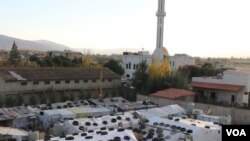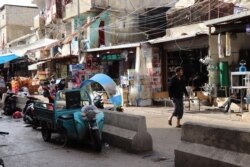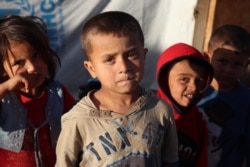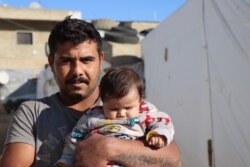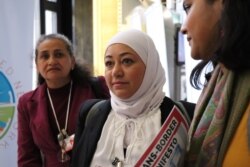In his early 20s, Mohammad was a law student who raised bees on his uncle's farm in Syria.
But in 2013, he faced a terrible choice: Join the military, join a rival militant group, face prison or flee his country.
"What if I had to kill my own people?" he said at a mobile phone shop in an urban refugee camp in Beirut. "I tried to flee to Europe many times. I was caught by the Egyptian secret police, and they sent me to Damascus."
There are now 70 million people "forcibly displaced" in the world, and their numbers are growing rapidly, according to the United Nations. Humanitarian aid is increasingly scarce, and the increase in refugees "is outpacing the rate at which solutions are being found," according to U.N. Secretary-General António Guterres.
As more people flee their homes, it is becoming increasingly difficult to determine who is entitled to protection under international law, and who is not.
"We need to uphold the refugee definition that is enshrined in the international legal system because it is strong, and we can leverage it in our discussions with States," U.N. High Commissioner for Refugees Filippo Grandi said at a Geneva conference on Tuesday. "We are not always successful, but we can use it. But we have to recognize also that many other people on the move have vulnerabilities and therefore need help."
A refugee's story
For every displaced person, there is a tragic story.
Mohammad fled Damascus to Lebanon, where he lives in a ghetto populated by refugees currently reeling from political and financial crisis. He gave up his education and left his family behind.
"If I had the money, I would go to a different country," he said. "There is no future here."
'Refugee' defined
Legally, a refugee is a person forced to flee home due to war, persecution, torture or other types of violence, according to Andrej Mahecic, a spokesman for the UNHCR, in an interview in Geneva on Tuesday.
Refugee status, entitling the holder to humanitarian aid and asylum in another country, does not apply to people who fled other hardships such as extreme poverty or failed school systems, he added.
When people flee their countries for any reason, they often travel along the same roads and end up in the same place, making it difficult for states to determine who is legally entitled to help.
"There is a lot of confusion about the terminology," said Mahecic.
After more than eight years of war displacing half the population, Syrians who fled their homes are generally considered legal refugees, according to the UNHCR. But not all countries agree.
Many officials in Lebanon, which hosts the largest population of refugees per capita in the world, say the Syrian war is winding down, and most of the 1.5 million Syrians in the country are now "economic migrants," a term that implies a person is not deserving of assistance.
In the Bekaa Valley in Lebanon, where many Syrians have lived in makeshift camps for years, families say the war left them with no choices. At one settlement, neighbors say all of their homes were flattened by bombs, and they have no money to rent apartments, even if they felt it was safe to go back.
Young men say if they return to Syria, they fear they will be sent to the front lines to kill or die after fleeing the country instead of serving in the military.
On a good day, some men earn about $6 working informally. But on most days, there is no work, said Mahmoud, a father of a four-month-old girl, in his home made of tarps draped over wooden beams.
"If I work once in a week, how is this money going to cover my expenses like electricity, rent and milk for the baby?" he said.
Policy shifts?
At the conference, Shaza Alrihawi of the Global Refugee Network was one of 60 refugees attending the 3,000-person refugee event.
In 2013, she fled Syria after someone fired a gun into her car, which was parked next to her house. It was a warning, she said.
She had received death threats, but she didn't know who attacked her car. Rebel groups and the government both accused her of siding with the other.
Increased humanitarian aid and policy shifts that help refugees get more jobs and education would alleviate some of the difficulties of living as a refugee, Alrihawi said. But the stigma and racism that often haunts refugees is harder to tackle.
"Becoming a refugee doesn't change who you are," she said. "I am still the same woman."




